

Noncompliant
Who wants to be
Complaint? After all
Her diagnosis isn’t
One that medicine can bend
She’d trade you ten diagnoses
For a single month’s rent
Of course she hasn’t swallowed
Each and every pill you promised-
Of course she craves more
Than a pinch of salt with breakfast
Nobody wants to back down
Everyone aches to get home
Of course the first thing that she did
Was spark a cigarette
Aren’t cigarettes delicious?
Here-
Let me take that good advice
Off your hands
Sit down
Have a drink
You remember?
What it’s like to live
By Gaetan Sgro, MD, VA Healthcare System, Pittsburgh, Pennsylvania, and published in the Annals of Internal Medicine, Vol. 177 No. 8, August 2024, p. 1137.
Half of What You Learn

Half of what you learn is wrong. We can’t
say which. The oracles of medicine
are fond of saying this, when blathering on
about progress. Like learning Latin
in high school, it’s not the principle of use
that counts, but the idol of discipline.
Study today, delete tomorrow. In a decade,
truth will bifurcate along an unknown line
into wheat to be retained; chaff, discarded.
There is something fishy about the rule
of glib transition from right to wrong
in the annals of progress — the human
is missing. The pain is missing. The action
is happening today. The podium
is nowhere to be seen in a patient’s room.
by Jack Coulehan, MD, Center for Medical Humanities, Compassionate Care, and Bioethics at Stony Brook University, Stony Brook, New York.
from the Annals of Internal Medicine Vol. 177 No. 4, April 2024, p. 540.
My Own Blood
I told her I liked the lines on her face,
the way her crow’s-feet speak of longing.
And she said thank you. You are kind.
I told her I liked her smile, the way it
brings out her eyes, how, in their depth,
they speak of loss. And she said, thank
you. You are a gentleman.
I held her hand and hold her I liked her
pale blue veins and her calluses, how
they speak of work and the lessons of
time. And, smiling, she said, thank you,
you are kind, a gentleman.

I brushed her white hair and told her it
shown like a golden crown. She said,
you are kind, a gentleman. You remind
me of my son. I said, you are my mother,
and I am your son. She smiled and said,
you are kind, a gentleman. A kind gentle-
man. You could be my own blood. My son.
“My Own Blood” was written by Benjamin D. Carson, PhD, at Bridgewater State University in Bridgewater, Massachusetts. It was published in the Annals of Internal Medicine, Vol. 173 No. 12, 15 December 2020, p. 1040.
Villanelle in Honor of American Hospitals
There was a time when hospitals were shy.
It wasn’t right to advertise or claim
to be the most compassionate, or any lie.
Without a marketing plan, without a guy
in charge of building the corporation’s name,
there was a time when hospitals were shy.

The major signs were, Quiet, please. A spy
who dug deeply within, would come out dry.
No most compassionate. No other lie.
Then the vicious tide came in and with it high
production medicine and slogans that exclaim,
My hospital — although quite shy —
has the biggest new machine. That’s why
we’re best! And for those who like to name
compassion their concern, they easily lie
with slogans like, We’re most humane. We try
hardest, we’re better, the best, our fame
for compassion is honest; because we’re shy
and unassuming. And for patients who fly
on the winds of awards, We won our acclaim
with the Gold Medal for Compassion. A lie.
In the cutthroat scene of caring, the sky’s
the limit. The target suffers for the aim.
There was a time when hospitals were shy,
compassionate, and didn’t lie.
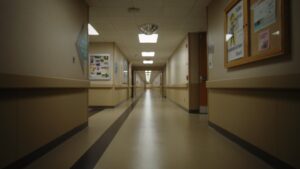
Poem by Jack Coulehan, MD, Center for Medical Humanities, Compassionate Care, and Bioethics at Stony Brook University, Stony Brook, New York.
Published in the Annals of Internal Medicine, Vol. 175 No. 2, February 2022, p. 304.
(A “villanelle” is a carefully structured poem. It’s composed of five tercets followed by a quatrain, with two repeating rhymes and two refrains.)
The Family Doctor by Edgar A. Guest
I’ve tried the high-toned specialists, who doctor folks today;
I’ve heard the throat man whisper low “Come on now let us spray”;
I’ve sat in fancy offices and waited long my turn,
And paid for fifteen minutes what it took a week to earn;
But while these scientific men are kindly, one and all,
I miss the good old doctor that my mother used to call.
The old-time family doctor! Oh, I am sorry that he’s gone,
He ushered us into the world and knew us every one;
He didn’t have to ask a lot of questions, for he knew
Our histories from birth and all the ailments we’d been through.
And though as children small we feared the medicines he’d send,
The old-time family doctor grew to be our dearest friend.
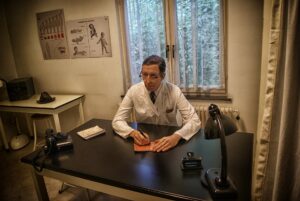
No hour too late, no night too rough for him to heed our call;
He knew exactly where to hang his coat up in the hall;
He knew exactly where to go, which room upstairs to find
The patient he’d been called to see, and saying: “Never mind,
I’ll run up there myself and see what’s causing all the fuss.”
It seems we grew to look and lean on him as one of us.
He had a big and kindly heart, a fine and tender way,
And more than once I’ve wished that I could call him in today.
The specialists are clever men and busy men, I know,
And haven’t time to doctor as they did long years ago;
But some day he may come again, the friend that we can call,
The good old family doctor who will love us one and all.
When thou arte called at anye time…
When thou arte callde at anye time,
A patient to see:
And doste perceave the cure too grate,
And ponderous for thee:
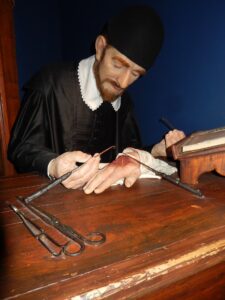
See that thou laye disdeyne aside,
And pride of thyne owne skyll:
And thinke no shame counsell to take,
But rather wyth good wyll.
Gette one or two expert men,
To help thee in that nede:
And make them partakers wyth thee,
In that worke to procede.
The poem above is from Goodlye Doctrine and Instruction, John Halle, physician (1529 – 1566)
I’m Fine
There’s nothing whatever the matter with me.
I’m just as healthy as I can be,
I have arthritis in both my knees
And when I talk, I talk with a wheeze.
My pulse is weak and my blood is thin,
But I’m awfully well for the shape I’m in.
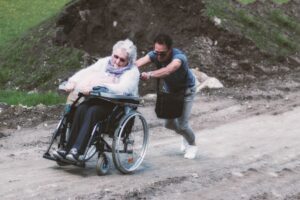
I think my liver is out of whack
And a terrible pain is in my back,
My hearing is poor, my sight is dim,
Most everything seems to be out of trim,
But I’m awfully well for the shape I’m in.
I have arch supports for both my feet,
Or I wouldn’t be able to go on the street.
Sleeplessness I have night after night,
And in the morning I’m just a sight,
My memory is failing, my head’s in a spin,
I’m peacefully living on aspirin.
But I’m awfully well for the shape I’m in.
The moral is, as this tale we unfold,
That for you and me who are growing old,
It’s better to say, “I’m fine” with a grin
Than to let them know the shape we’re in.
by James H. Motschall, Detroit
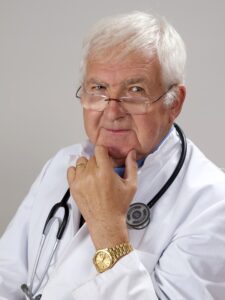
Speak of your Science
Speak of your science, but when all is said,
Patients like a bald and shiny head.
Age lends the graces that are sure to please.
Folks want their doctors moldy, like their cheese.
